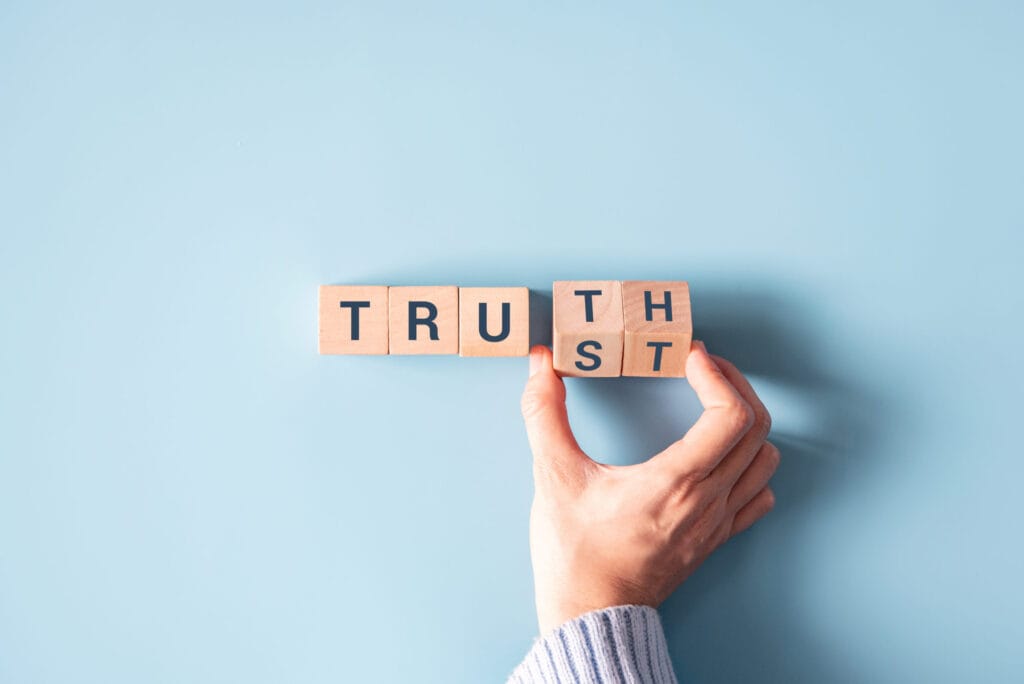[ad_1]
How a lot belief does your group expertise? That’s the primary query I ask after I do a tradition evaluation with the companies I serve. Belief is the important ingredient and basis for all relationships and companies. Except leaders construct belief, they’ll’t construct something that can succeed for the long run, and any form of organizational change will likely be significantly challenged.
Organizational students outline belief as our willingness to be vulnerable to the actions of others as a result of we imagine they’ve good intentions and can behave effectively towards us. In different phrases, we let others have energy over us as a result of we don’t suppose they’ll damage us; we predict they’ll assist us and have our backs. When the belief degree is excessive inside coworker relationships, it corresponds to trusting the corporate that employs us, and we really feel assured it received’t deceive us or abuse its relationship with us.
However what are the mechanics of this? How do we trust? To be able to belief somebody, particularly somebody who’s unfamiliar to us—which implies we haven’t had the chance to develop belief but—our brains construct a mannequin of what the individual is prone to do and why. And there’s quite a bit occurring beneath the floor; we use each mindfulness and empathy throughout each collaborative endeavor. This implies each individuals in an interplay are at all times assessing, Ought to I belief you? How a lot do you belief me? A few of us are innately trusting, naturally searching for optimistic intent and placing we, earlier than me. However in my expertise, belief is earned. Because of this it issues that we as leaders construct belief with these we lead. It isn’t sensible to belief somebody blindly till you’ve got vetted that they’re, the truth is, reliable.
Belief and Security Requires Nurturing
The extent of belief in a company is influenced by how a lot psychological safety exists. Do individuals really feel protected voicing their trustworthy opinions? Do they imagine that any criticism aimed their means will likely be truthful and that their response to it is going to be heard? Groups that take pleasure in excessive belief ranges have been proven to be extra artistic and to come back to choices quicker. They’re higher performing teams as a result of they’re prepared to confess errors and to name out issues and challenges and ask for assist. If two groups are equally sensible, why would a extra trusting group be extra productive than a much less trusting one? As a result of they iterate quicker. They be taught quicker. And why do they try this? As a result of they belief one another to be trustworthy and level out the issues they’re discovering in actual time. A basis of security helps these group members perceive and develop these discoveries rapidly, collaborate smoothly, and cocreate with movement.
Within the office, belief is extremely influenced by management as a result of leaders model the behaviors others will follow. When leaders lead with worry and dominance, belief and security endure in the long term. A boss who berates, threatens, or punishes you’ll have an effect on your efficiency and talent to talk up authentically as you focus your consideration on self-protection. This results in emotions of “discovered helplessness” as staff keep away from the boss and/or stay as invisible as they’ll by doing the minimal. And face it: this sort of management conduct hurts, to the purpose of inflicting trauma.
People expertise social rejection and social ache within the mind’s ache matrix for longer than they expertise bodily ache. Analysis in neuroscience has proven this. We’re wired to connect and belong. If we lack the belief and security which are important to belonging, we really feel that our very survival is threatened, which prolongs our struggling. To show this round, we will consciously and actively work to create better belonging utilizing acutely aware management strategies at work and on the earth. Belonging means belonging to your self, in addition to being related to a objective bigger than your self.
Authenticity In Motion
Being genuine is likely one of the quickest methods to create psychological security within the office.
Psychological security is the sense that we will share our emotions, beliefs, and experiences overtly with others at work with out worry of reprimand, dropping standing, or punishment. Research on psychological security performed in collaboration between Google and the Massachusetts Institute of Expertise (MIT) discovered it to be some of the essential elements in creating profitable groups and thus excessive performing, modern organizations. This perception is the results of virtually 30 years of analysis by Amy Edmondson. Psychological security helps average danger taking, talking your thoughts, creativity, and most significantly belief. In my work with groups and senior leaders, I assess the psychological security of the person chief, the group and the tradition first.
Earlier than leaders construct belief by being brave in our interactions with others, we want the braveness to grasp ourselves and what’s essential to us. Check out this apply that focuses on cultivating this understanding.
A Conscious Follow to Deepen Your Internal Belief
Discover a quiet area when you can and take out a journal. Take a minute or two to breathe and faucet into your heart. Now consider a current expertise you had with a associate, good friend, member of the family, or coworker the place you wished to be genuine, however weren’t. Think about pausing on the peak of this interplay and asking your self the next questions:
- What am I afraid would occur if I shared my ideas and emotions with this individual proper now?
- How will I really feel if I don’t share them?
- If I weren’t afraid, what would I most wish to say to this individual proper now?
- How can I be much more open and weak?
Cultivating Belief with Your Groups at Work
As leaders and managers, it’s essential that we’re the primary ones to mannequin the right way to be genuine within the office. Josh Tetrick, cofounder and CEO of Eat Just, Inc., and I talked about his strategy of hiring for resilience and growing a resilient tradition by main with authenticity. Before everything, Josh makes it clear in his communications what he cares about most. Eat Simply’s mission is to extend the consumption of plant-based meals, to scale back animal maltreatment and forest degradation. Josh has discovered that the extra assured he’s in his mission and who he’s, the extra weak and humble he will be when he makes errors.
He now acknowledges that when Eat Simply was simply beginning, he projected extra self-assurance—to the purpose of conceitedness—than he actually felt as a result of he wished to sound extra assured than he actually was. However as he’s stepped into main, he’s discovered that he’s good at some issues and never so good at others, and he is aware of and accepts that. This frees him from feeling the necessity to overcompensate and permits him to be his genuine self.
Josh let me in on among the issues he says when interviewing new hires: “That is the form of firm we’re—that is the mission. For those who gave me a 100% likelihood to get purchased by an investor or a 20% likelihood to remain within the ring and get nearer to attaining our mission, I’d select the 20% likelihood.”
Then he tells potential new hires he desires them to ask themselves in the event that they’re prepared to get gritty, step into the unknown, and keep centered on that mission for the lengthy haul. Sharing his fact upfront on this means weeds out individuals who aren’t the best match for the tradition. Josh takes the identical method with traders.
Josh additionally asks job candidates questions which are designed to evaluate their resilience, as a result of he’s discovered that those that are the very best match for his firm are inherently resilient. Josh affords an important instance of how leaders construct belief by cultivating a robust internal recreation of authenticity and sharing your fact and confidence as a frontrunner on the surface.
Main from authenticity generally means leading from vulnerability. In response to Brené Brown, vulnerability entails uncertainty, danger, and emotional publicity. As a frontrunner, you’ve got the chance to create circumstances that assist naming the fears that come up round being weak. As soon as they’re named, you will get previous worry to the place the place braveness arises and encourage extra confidence, teamwork, and connection.
4 Questions to Foster Your Authentic Self
After we worry that we will’t suppose and act as we really are, we put components of ourselves on maintain. Right here’s how we will start to let go of expectations and pressures and have a tendency to our desires and wishes with kindness. Read More
Why Vulnerability is Your Superpower
Dr. Michael Gervais speaks with writer and researcher Dr. Brené Brown in regards to the relationship between vulnerability and braveness, and what it takes to point out up even when you may’t management the result. Read More
[ad_2]
Source link

